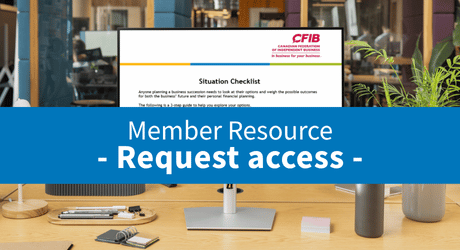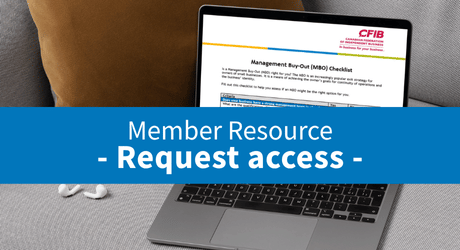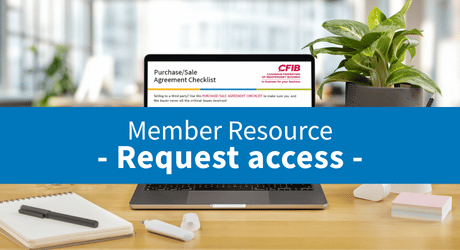Succession Start

Guiding your path to buying or selling a business
Selling, transferring, or closing down your business is a big undertaking. The same is true for purchasing a business and making sure the transition goes smoothly. Whether it’s around the corner or several years away, early planning and understanding your options will help you maximize value and make confident decisions.
The Canadian Federation of Independent Business’s (CFIB) Succession Start simplifies what you need to know, with practical resources and member-only tools to guide you.
Thinking of selling or exiting your business?
Exiting a business can mean passing it to family, selling to employees, or finding a third-party buyer. Each path comes with its own challenges and opportunities.
Looking to buy a business?
Purchasing a business can be rewarding, but it’s important to know what to look for before making the leap.
Resources
Exclusive to CFIB members
Access a customized business owner succession plan through our partner, People Corporation.
Frequently Asked Questions
What is a formal succession plan and why do I need one?
A formal succession plan is a document that maps out the steps for your business to take leading up to the moment you leave your business. The plan outlines an exit strategy that achieves the best possible outcomes for you and your successor.
Learn more about formal succession plans in our articles What is a succession plan, Why you need a succession plan and Building a Succession Plan.
What costs do I need to consider when selling my business?
Common selling expenses include professional services fees, such as legal and accounting, appraisal costs, and broker’s commissions.
You may want to speak to an accountant to help reduce your tax liability and get your business’s financials ready to present to a buyer.
Independent legal advice can also help ensure that you are not exposed to any lingering personal liability after the sale.
Other less obvious costs could include pre-payment penalties on loans, franchise transfer fee, and termination compensation (notice and/or severance) if your existing employees do not stay with the business.
What is a business valuation and why is it important?
A valuation considers both the tangible and intangible assets of a business. Tangible assets are things like property and inventory, while intangible assets include patents, trademarks, and customer goodwill. Measuring a company’s value is not so much about how it has performed in the past but gauging how well it will perform in the future and so determining its fair market value. Due to tax considerations, it’s important that the valuation is done by a professional to avoid any challenges.
You can read more about business valuations and how they are done in the article, Business Valuation.
I need to sell within a year, what do I do? What are the pitfalls?
Exiting your business quickly requires effective planning, and often outside help. An important consideration is your business’ financial and operational documents. Your records should be organized, complete, and ready to present to a potential buyer. Be prepared to showcase your business’ value and to overcome potential objections ahead of time.
Some tax planning strategies can require time to put in place, and a quick sale could lead to a higher tax bill in certain circumstances. For example, selling a sole proprietorship or corporate assets such as buildings or equipment that are not farm or fishing related generally disqualifies a seller from claiming the Lifetime Capital Gains Exemption (LCGE), but it could be possible to “roll over” business property into a corporation and later (usually after 24 months) sell the corporate shares and claim the LCGE.
A quick sale could also mean missing out on more favorable offers if you did not have time to properly advertise and showcase your business.
Selling over a period of time can be tax advantageous and may help the buyer find financing (increasing the likelihood of the sale closing).
Can I access the LCGE?
There are certain criteria that need to be met to access the Lifetime Capital Gains Exemption (LCGE), including:
- The shares should be of a “qualifying small business corporation.”
- The company used more than 50 percent of its assets to carry out active business for the last two years
- The shares must not have been owned by anyone other than you or someone related to you in the 24-month period before the sale.
Because some of these rules must have been met continuously for at least 24 months, you may not be able to access the LCGE if you sell within a year.
It is very important to speak with an accountant or tax professional before selling, so you can be sure to maximize your tax savings.
What happens to my employees if I sell?
It depends. The primary factor will be the nature of the sale; was it a share purchase or an asset purchase?
If the company was sold in a share purchase, then the employer continues to be the same entity, and there is no termination or new contract of employment. There may be new shareholders, but that does not change the relationship between the employer and employee(s).
Conversely, if there is an asset sale, the issue becomes more complex. Provincial employment standards legislation provisions will generally provide that employment is deemed to continue if certain criteria are met. Please speak with your provincial/territorial employment standards office, or with a CFIB Business Advisor if you require more information.
I’m a sole proprietor; how do I sell my business?
As a sole proprietor you can only sell the assets of your business (for example: furnishings, equipment, customer list, etc.) you are not able to sell the business registration. You will need to close your business by filing paperwork (typically called a Notice of Dissolution) with the province/territory, and notifying CRA, Workers’ Compensation, and other relevant government agencies that you have closed. It is your responsibility to settle any outstanding amounts that are owed on your accounts.
What do I need to know about selling my franchise?
You will need to check your franchise agreement to confirm your rights and responsibilities when it comes to selling your franchise.
The agreement may cover such topics as:
- Whether the franchisor wishes to approve the new franchisee
- How the selling franchisee should handle any outstanding accounts
- What will happen with regards to royalty rates and advertising contributions (will these change or remain the same?)
It is strongly recommended to discuss your obligations with a lawyer to ensure you meet them all.
CFIB members have access to best-in-class legal support through our partner LawVo. Contact a CFIB Business Advisor to learn how you can find and retain a lawyer and benefit from a 25% discount on legal fees.
Why CFIB?
In business for your business. As Canada’s largest association of independent businesses, with over 100,000 members across the country, CFIB is here to support you at every stage of your business journey.
As a member of CFIB you get more than perks. You get a team of knowledgeable advisors on your side who are devoted to providing you with 1-on-1 advice when you need it most; small-business advocacy to all three levels of government; and help increasing your bottom line with exclusive discounts. Don't just manage your business - enhance it with CFIB.













